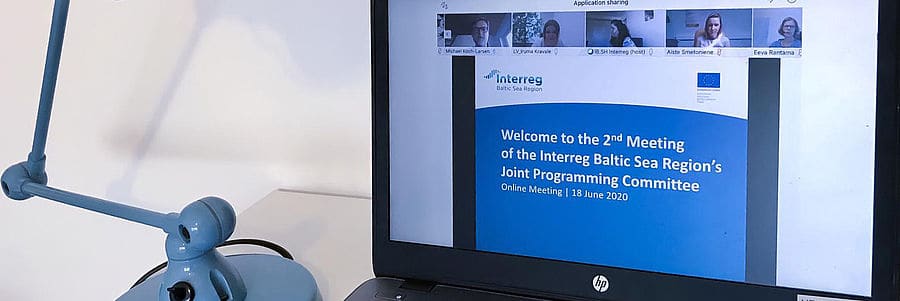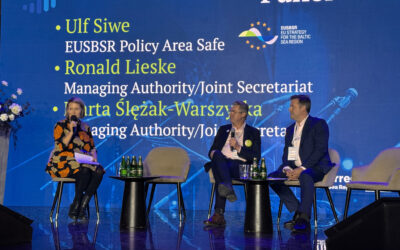Delegates from eight EU Member States and three neighbouring partner countries around the Baltic Sea agreed on the thematic framework for the future Interreg Baltic Sea Region Programme. The Joint Programming Committee convened on 18 June 2020.

© IB.SH/Marta Ślężak-Warszycka
Multitask to implement the Programme and plan the future
In parallel to the implementation of the current Interreg Baltic Sea Region Programme at full speed with almost a hundred ongoing projects and new extension and seed money projects recently approved, the preparations for the next programming period 2021-2027 are well advancing.
Already in February 2020, representatives of the Member States and advisors from the Managing Authority/Joint Secretariat and the European Commission officially kicked off the process to develop the future Programme. After written consultations in April and two online workshops held in May, the Joint Programming Committee was ready to agree on the thematic focus for the future Programme.
Thematic focus for the future Interreg Baltic Sea Region
The Joint Programming Committee concluded that ensuring support to the transition towards greener, climate neural, more resilient and digital Baltic Sea region shall be the driving force for all the actions that the future Interreg Baltic Sea Region would co-fund. The approach taken is demand driven, with public authorities serving local communities and local companies as the main target group.
The proposed future framework is built on three thematic pillars. The first one is dedicated to innovative and resilient economies and societies as well as responsive public services. The second theme refers to the sustainable use of Baltic Sea and regional water resources adapted to the impacts of climate change. Climate change mitigation, as the third theme, will enable to support to circular economy, low carbon energy systems as well as green and intelligent transport.
On top of this, the future Interreg Baltic Sea Region will continue supporting cooperation among the EU funding programmes through project platforms as well as the governance of the EU Strategy for the Baltic Sea Region.
Have your say: time for public consultations
For the Joint Programming Committee, it is of utmost importance to shape the Programme in the way that that future funded projects would respond to the actual needs in the region. Therefore, based on the agreed thematic framework, interested public in the Baltic Sea Region Programme, public authorities, experts, stakeholders of the EU Strategy for the Baltic Sea Region, pan-Baltic and national institutions are invited to share their comments, opinions, and proposals in the public consultations.
The public consultations will be open for eight weeks starting on 13 July to ensure transparency of the process, and to provide time and space for a dialogue, which is the basis for a cooperation programme like this. Any suggestions for amendments will be thoroughly analysed for the further programming process.
Additionally, the key players for implementing the EU Strategy for the Baltic Sea Region will be invited to share their comments in a separate survey.
Programme bodies nominated
In order to facilitate the programming process, the Joint Programming Committee approved the application of the Investitionsbank Schleswig-Hostein to act as a joint Managing Authority, Paying/Certifying Authority and Joint Secretariat for the Interreg Baltic Sea Region Programme 2021-2027.
The Investitionsbank Schleswig-Holstein has acted as the Managing Authority, Paying/Certifying Authority and Joint Secretariat since 1997. In the future Programme, it will continue helping the Interreg Baltic Sea Region Programme to serve as a platform for working together and for letting innovative solutions become common practice across the region.
At the same time, the Ministry of Justice, European Affairs and Consumer Protection of Schleswig-Holstein was approved as the Audit Authority for the programming period 2021-2027.
Next steps in shaping the future Programme
After analysing input collected in the public consultations over summer, next steps in the programming include two Programming Task Force meetings on 23-24 September and 29-30 October, and the 3rd Joint Programming Committee meeting scheduled for 2-3 December 2020. At the December meeting, it is it is expected that the Member States would approve the first draft of the Programme.






